Dear Reader, in this age of AI created content, please support with your goodwill someone who works harder to provide the human-made. Sign up at the top of the lefthand column or bottom of this page. You will receive my hand illustrated monthly newsletter RESTORE NATURE and access to the biodiversity garden design course as I write...and nothing else, I respect your time. I am also removing the advertizing as best I can as its become intrusive inappropriate and pays me nothing.
Your BODY, your Garden
healthy living tips based on achieving a natural ancestral way of life in the urban jungle
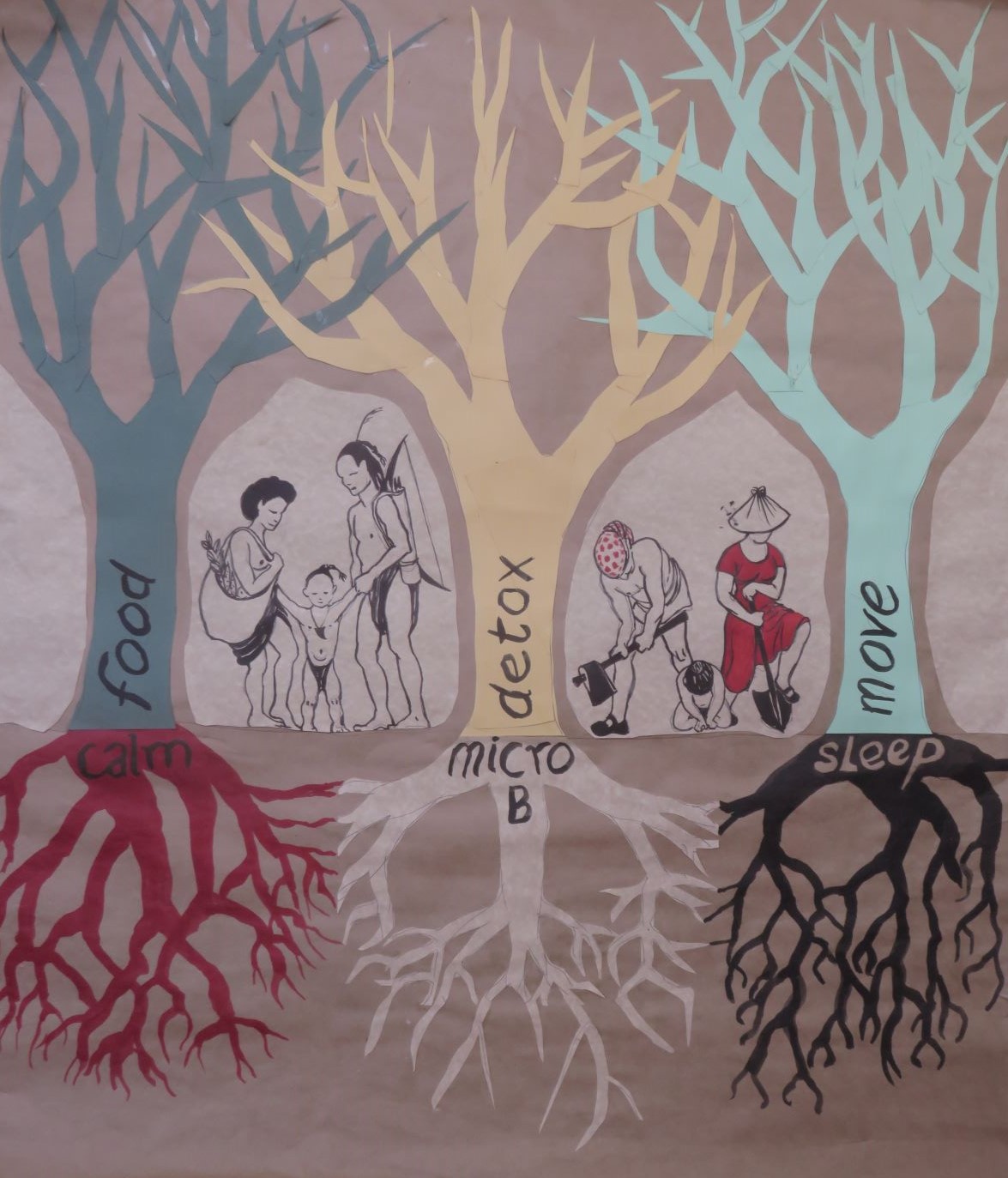 The common ground in a war zone: six pillars of health: diet, exercise, sleep, and the management of stress, toxic exposure and microbiome. The marriage of ancestral healthy-lifestyle models achieved in permaculture based gardening.
The common ground in a war zone: six pillars of health: diet, exercise, sleep, and the management of stress, toxic exposure and microbiome. The marriage of ancestral healthy-lifestyle models achieved in permaculture based gardening.Your gardening is both
significant and political
We hear about global warming, mass extinction, and how pure profit drives the world. Megacities like Cape Town suffer nearly running out of water, and in 2050 the world may run short of food due to loss of arable soil. Modern medicine has overcome most epidemic diseases, but now there is a global plague sweeping industrial nations, and spreading with the spread of industry, causing early death from diabetes, cancer, Alzheimers, autoimmune illness and heart disease. It seems impossible but all of these things are connected, and it seems even more fantastic that all these problems share a common solution.
This solution is to increase the permanent plant cover on earth, and thereby its blanket of living soil, which is the greatest natural carbon sink bar the ocean. By extension this supplies more diverse and sustainable food for humans. You and your garden stand at the center of a firestorm of ecological issues. Having a natural, permaculture based garden with a backbone of diverse, native-as-default, perennial food plants promotes the health of both your body and the planet.
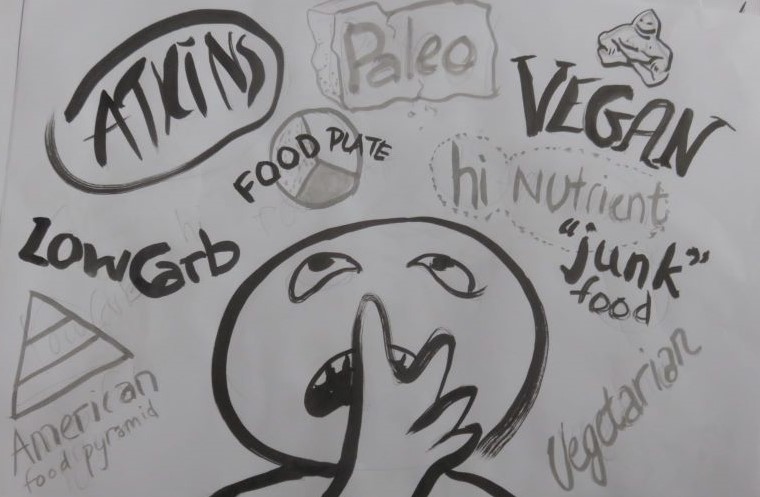
The six pillars of health and
healthy living tips
I've sat in hospital queues and it made me want to help myself and other people to stay out of hospital. During reading I found that the closer scientists look into our metabolism, or body chemistry, the more complex it gets. BUT, the more their findings justify some of our grandmother's simple habits.
There is a war of words, especially around the macro-nutrients: protein, carbohydrates and fats, and about plant and animal nutrient sources. Various armies of experts in the often slanderous and extremely polarized debates, recommend cutting out whole categories of nutrients, which have become labeled as poisons. They cite scientific literature as support, they all do, and all of them accuse the opposition of having no scientific basis. This leaves the lay person in confusion, while we are told we are dying in our millions due to our dietary ignorance. If one were to play it safe, and listen to all of them, there would be nothing left to eat. Starvation.
The information on health, and especially diet, is thus overwhelming and conflicting. But at the center, all the good health advice revolves around management of the same 6 pillars: (just click to follow the links) stress management, exercise, sleep, diet, a diverse microbiome (see diet), and avoiding poisons (see diet, sleep and stress management). You can find help with all 6 pillars in your garden.
Dietary recommendations from various factions seem to have only a small area of common ground. Eat lots of leafy greens, especially from the cabbage family. Cut junk food (take away, mass produced or factory made food). Prepare your own food, and reduce or eliminate sugar. Sugar and fat are at the center of the war zone. Both are blamed for the epidemic of inflammatory disease mentioned above. A cautious reaction to their polemics and finding a middle road seems to be required.
Does thinking about my own
ancestry help me ?
or must I listen to my gut ?
I've had a look at my own ancestry: mainly Germanic with a smattering of Ashkenazi, South East Asian, African and Portuguese. Speculating about what they ate doesn't help me that much.
Its confusing looking at my ancestry. I guess I have to look at my own reactions to various diets.
What did I crave as a child ? How do I feel about eating a lot of fat or sugar now ? How does a bread based diet sit on my adipose tissue and my nerves ? What are my favorite foods ? Is high cholesterol a bad thing in older women, or is it protective as some research suggests ?
Considering all of this I'm customizing my diet as follows, and you can customize yours:
I will: Give meat and fat the proper neolithic scarcity value, but also diminish my intake of grains. For energy I'll increase root vegetables, legumes and ferments, and add the occasional cream sauce or bone soup. But I will not cut grains completely. I know sauerkraut, olives, Schwarz and Weisswurzel, cabbage family greens, beets, herbs, herring and fermented milk. I'll limit cheese (it makes me nauseous in excess), amp up the spices and set out to learn more about the classes of food from South East Asia, Africa and the Middle East that fit the bill, to see if they suit me.
Cutting fat out
completely as in the American Heart Association diet based on Ancel Keys
advocacy is not historically justifiable. Low fat
everything also feels like a bad idea. But too much fat isn't good either. I really NEED flavor, lots of vegetables and rainbow colored food.
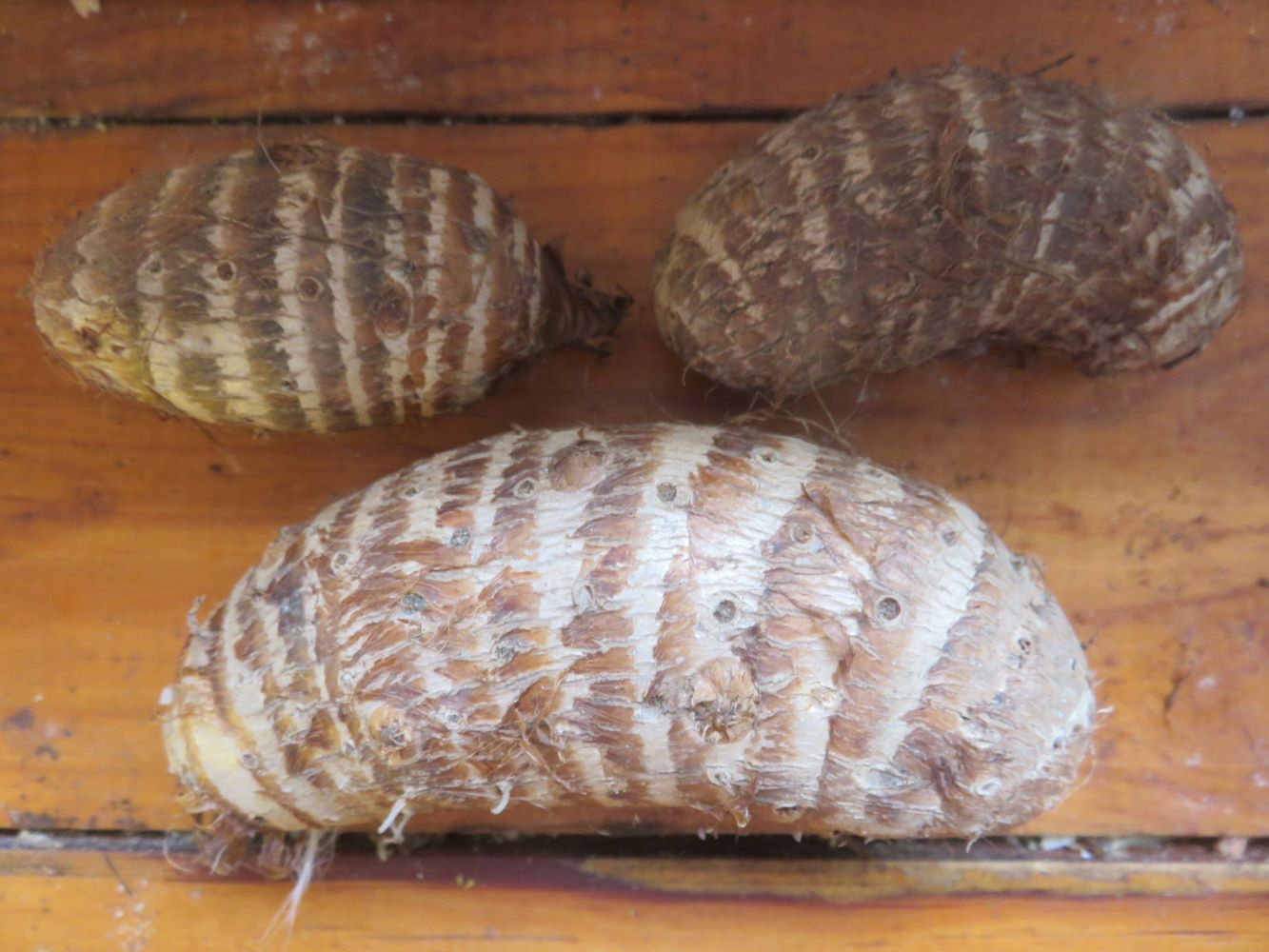 Is this the right root for me
Is this the right root for meWe need to find our own way
For the present we need to find our own way through the maze, and a compromise between the armies. It is up to the individual to dodge rockets and mines, lend a deaf ear to some, and closer but never devotional attention to others. This is good, it is almost the solution. Individuality is key. Researchers in genetics and epigenetics have found that the differences between individuals' ability to absorb nutrients is much greater by factors of hundreds, than the differences in nutrient provision between the various diets.
There
is therefore no one healthy diet that suits everyone. We all have to
become masters of hearing our own body's quiet symphony play to us. We
have to learn to listen closely to the tap tap tap of coded messages
coming from our metabolism and flora. We have to digest not only leafy
greens, but vast amounts of conflicting information to gain some
overview. We not only need to find a middle road, we need to practice
the things which ALL armies advocate, and see how our body's react. It
all takes time.
Rather than waiting till we're sick to think about health, we can strive for health now to avoid getting sick. We can control our lifestyle choices and treat ourselves with love, listening deeply to our own bodies, now that we've been alerted to the need to do so. When we get sick, we find ourselves without much control in the care of people who care less than we do about us. With some small changes, we can reduce the risk of disease, and if already sick, can lighten the burden and take back some control. Health is a long term project of adjustments and balancing. Best to start soonest.
The chief cause of illness according to many experts across the warring factions is inflammation.
Inflammation is the reaction of your immune system to a threat. It is a state in which some processes are shut down and others boosted, so in the short term it is protective, but if we don't revert to normal metabolism, it can hurt us. On your skin a short term reaction to an insect bite shows as sore redness, in your whole body, perhaps a fever, but when inflammation is permanent, or chronic, you get Diabetes type 2, some cancers, arthritis, and Alzheimers. These are to a large degree preventable diseases if you stop them early. Its necessary to stop the chronic inflammation, and this usually depends on lifestyle choices, for most people.
So why don't we get healthy living tips from our present heath care ?
In the last few hundred years, medicine specialized increasingly in negative manifestations like disease and trauma, not in the positive maintenance of good health. Positive health management is left to medical disciplines like dietetics which highly paid disease and trauma experts may have seen as rather peripheral till recently. In their 6 years of study the average medical doctor only spends a few hours on diet and exercise. They, quite rightfully, do not see your positive healthiness as their field of expertise. The doctor in his silo, and the dietician in his (often hers) and the gym instructor, do not interact richly for the most part, nor are the doctors paid extra for spending extra time with you. How can they puzzle out what is going on in your very complex body with its complex interactions, and its totally unique individual variants.
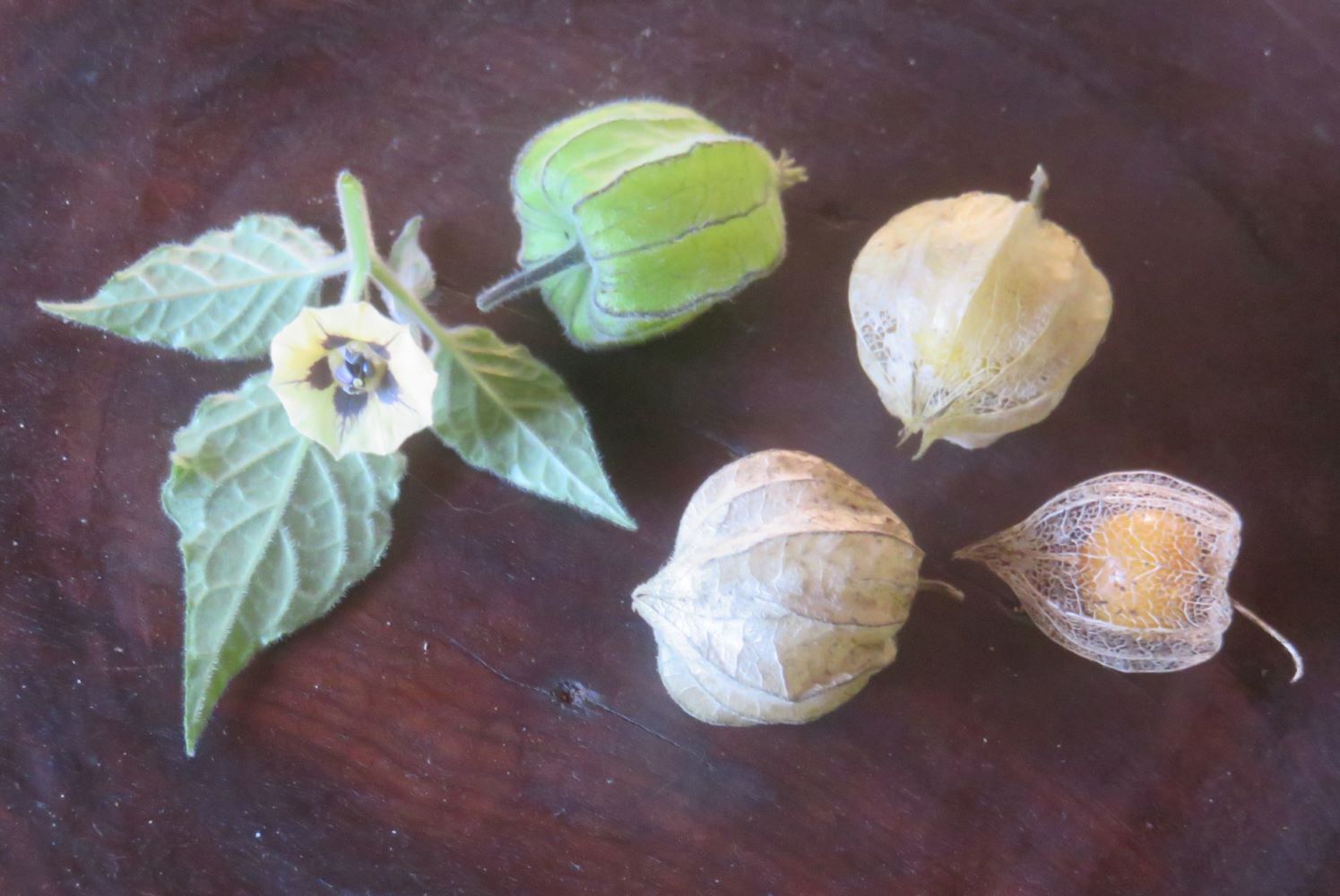 The Cape gooseberry. Very nutritious, but it originally came from Peru. Plants adapt and so can we.
The Cape gooseberry. Very nutritious, but it originally came from Peru. Plants adapt and so can we.Its up to you,
and the responsibility is great
When it comes to staying well, you are on your own. You will also be need to have the combined knowledge of several medical experts to do right by yourself. Health is hard work and requires the mental strength to embrace opposites. We need to remain objective, and not be swayed by persuasive but one sided academic propaganda and sales pitches in the health market place, and be incredibly subjective, and attuned to our own body's quiet voice, in the same breath. On the other hand, good health can be very simple too. It is possible for every one of us. Its really basic, even primitive suss.
In the meantime, new health research appears to be changing the direction of medicine towards studying metabolism and preventative health care. One day, they family doctor will have the expertise and knowledge to help you remain well naturally, if he or she is smart and curious.
In the meantime, the new research constantly reinforces the six pillars of health we can practice at home, while enriching the possibilities with opposing viewpoints, strife and new ideas .
The new research also, like a red thread running through the craziness of the information overload, makes us remember and respect our ancestors. The oldest, healthiest people in the world in the blue zones where many reach a hundred, all come from rural areas. Not every good thing about rural life is do-able in this century, but exposure to nature is beneficial on a cellular level. We need to ask ourselves what our bodies probably evolved with when we make health choices, and the answer is usually very like grandma's advice.
The changes affect many aspects of metabolism and help us understand health
The changes matter very much, because the changes in modern life are making us sick.
These changes are the transition from hunting and gathering to agriculture, refining food and artificial food, industrial toxins, sedentary lifestyles, materialism and competition, stress, not sleeping and loneliness.
Many diets look to our hunter gatherer ancestors as models. Other research claims our genetic adaption to food occurred long long before that, before we were Homo sapiens. Agriculture started twelve thousand years ago, long long before the pyramids, but In terms of DNA change that is like yesterday. With agriculture we shifted to fewer foods, and an excess of some of them, instead of diversity spread over many plants and animals. We haven't had time to adapt to so much maize, soya, wheat, and dairy, or the refined white powders we overdose ourselves with, called sugar and flour, which have only been around for four hundred years. The artificial chemical foods, only came in 1950 after WW2.
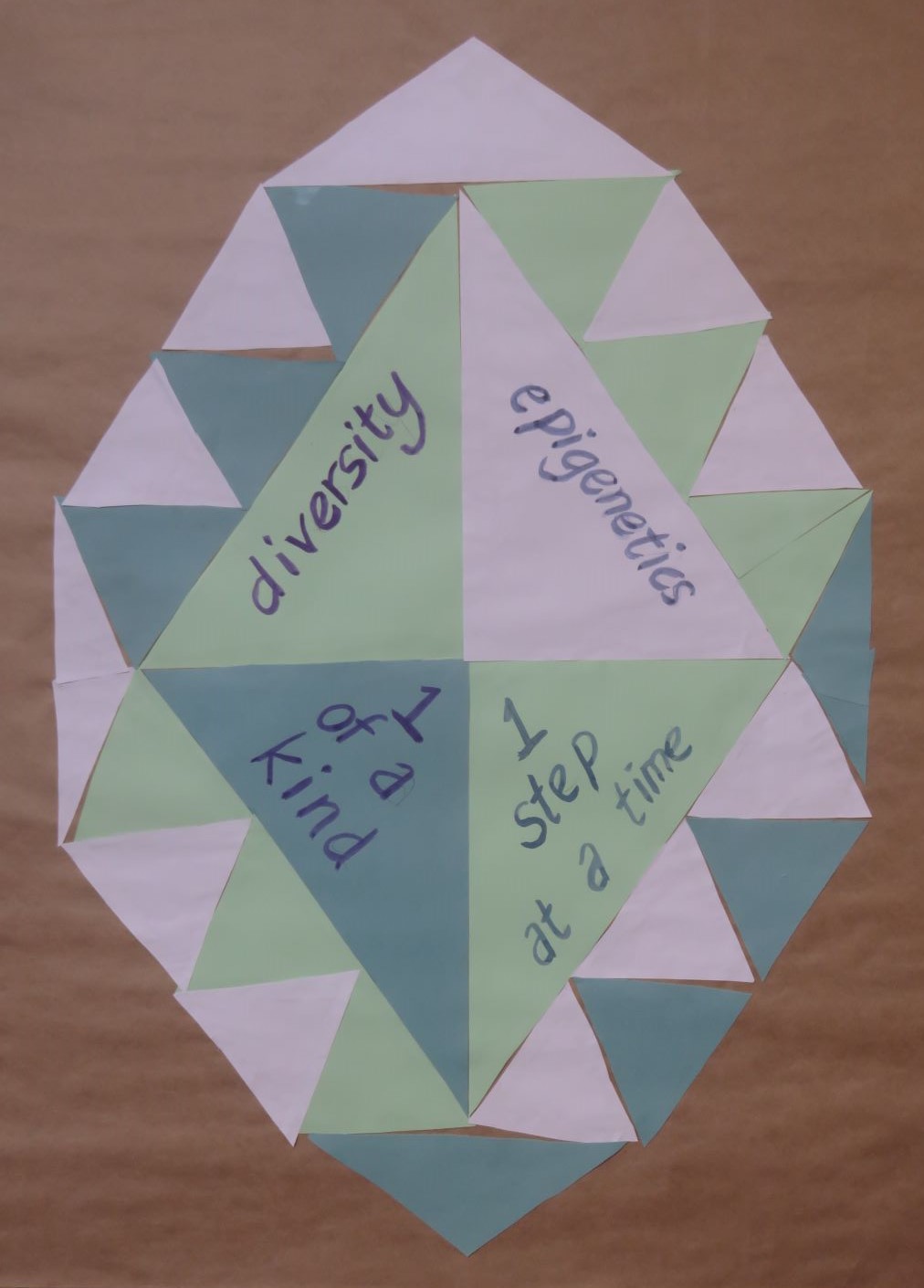 A diamond, made of pure carbon, is the symbol of preciousness. More precious is life itself, and this means managing carbon, in the atmosphere or safely sequestered in soil.
A diamond, made of pure carbon, is the symbol of preciousness. More precious is life itself, and this means managing carbon, in the atmosphere or safely sequestered in soil.Diversity
and healthy living tips
Humans have adapted to many different diets. Eskimos they say, I don't know how true it is, can live well on meat and fat alone, others eat only vegetables and dairy, some cannot drink raw milk, or wheat, and others live on milk or even blood. Japanese people can digest seaweed, and 2000 forms of seafood which other people cannot digest. So our traditional food often suits us. But there are actually very few DNA adaptions that are specific to diet according to a recent article (referenced on the healthy food page) which claims that dietary adaption is far more conservative than we've thought up to now. Our digestive mechanisms and metabolism, and the genetic drivers were largely blueprinted before we were even human. So our adaptions to certain diets must be epigenetic, and related to our microbiome, I think. We inherit microbes and genes from our parents that make our ideal diet ancestral, but also totally individual, as unique as our faces.
Epigenetics
and healthy living tips
When it comes to disease, we are not doomed to a narrow destiny of illness by our genes. Recent research shows genes are more like the loaded gun. Your lifestyle choices are like pulling the trigger. Epigenetics is how your genes' making of proteins switches on and off in response to circumstances, and they are doing so constantly. Food has one of the greatest effects on epigenetics, but exercise, mental attitude, stress, sleep and hormesis all affect gene expression.
Eating the elephant
and healthy living
Doing it all yourself is time consuming and intimidating and inconvenient. Do it step by step, not all at once, Do what's easy, to achieve success and keep motivated. Every change makes you stronger. Its actually nearly impossible to do it all. keep at it, keep improving slowly over years, till your health improves and you never want to go back. Do it with someone.
You are truly one of a kind,
and so are your dietary needs
Learn all you can, starting with a visit to your library, or a google search, or the list below and then do what suits you best, not what someone tells you. Respect the uniqueness of your own body. It is indeed your very own garden.
People in Cape Town who can help you with skills.
Zayaan Khan on facebook teaches fermentation
Davina Doyle school garden at Lavender Hill primary https://twitter.com/plantupza
Guerilla House workshops teach fermentation, gardening and permaculture
Soil for Life workshops teach how to create soil and grow vegetables https://www.soilforlife.co.za/
Volunteering at Babylon's Toren vegetable garden and other projects
SEED in Mitchell's Plain for volunteering and learning https://seed.org.za/
Books in the Goodwood library with shelf number
Spice as medicine
Dr Keith Scott Medical Seasonings: The Healing Power of Spices 615.321SCO
Herbal medicine
Bernie Rowen Natural Solutions:an easy to use reference for everyday ailments 615.321ROW
Reader's Digest Nature's Medicines: A South African guide 615.321NAT
to herbal medicines and what they can do for you
Dr David Peters & Anne Woodham The complete guide to Integrated Medicine: Complementary therapies combined with medical science.How to choose the best treatment options615.5PET
Penelope Ody The Herb Society's Complet Medicinal Herbal Q615.321ODY
Penelope Ody 100 Great Natural Remedies Using healing plants at home Q615.321ODY
Julia Lawless Essential Oils The complete guide to the use of oils in aromatherapy and herbalism Q615.321LAW
Margeret Roberts Edible and Medicinal Flowers Q615.321ROB
Lesley Bremness The Complete Book of Herbs :A practical guide to growing and using herbs Q635.7BRE
KEYWORDS
growing herbs
growing vegetables in South Africa
permaculture
diabetes
exercise
heart disease
gut flora
gut friendly diets
foraging
wild food
microbiome
hormesis
High intensity interval training
High nutrient diet
mitochondrial health
Paleo diet
veganism
vegetarianism
sibo diet
ONLINE REFERENCES
These online sources offer free courses or video series, or just further information
stress management
Science of Happiness EdX Berkeley MOOC
https://www.edx.org/course/the-science-of-happiness-4
autophagy
Dr Peter Attia on intermittent fasting (anti establishment keto evangelist)
https://www.youtube.com/watch?v=EklA1iI2Iy8
gut flora
interconnected series (very informative) Dr Pedram Shojai
old uploads https://www.youtube.com/playlist?list=PLDuI05sWufla2cohYlLa-CfAKzD23PTNV
University of Wageninen on EdX (less richly informative) MOOC
https://www.edx.org/course/nutrition-and-health-human-microbiome-2
prebiotic foods https://www.healthline.com/nutrition/19-best-prebiotic-foods#section6
herbal medicine
REMEDY SERIES https://remedy2.thesacredscience.com/register-g/
cancer
THE TRUTH ABOUT CANCER SERIES (It has come (under heavy fire for supporting quackery and is accused of being very biased and selective. Contains lots of information about prevention and useful info for general metabolic health)
longevity
the human longevity project https://humanlongevityfilm.com/
a film series on blue zones and the healthy habits there, EPIGENETICS and more
Interview podcast by Brian Vaszily, the best years of your life start now
https://theartofantiaging.com/summit-nonlaunch/
Peter Attia on the maths of longevity
https://alivebynature.com/dr-peter-attia-how-you-can-increase-healthspan/
mitochondria
Ari and the energy blueprint
https://www.theenergyblueprint.com/
plant biology
MOOC with Coursera, University of Tel Aviv
https://www.class-central.com/course/coursera-understanding-plants-part-ii-fundamentals-of-plant-biology-6799
biochemistry
MOOC from Harvard
https://online-learning.harvard.edu/course/principles-biochemistry-1
The importance of regeneration of soil
http://www.regenerativeagriculturedefinition.com/
https://www.google.com/search?client=firefox-b-d&q=ecosystem+regeneration+camps
https://www.mindbodygreen.com/articles/how-you-can-eat-to-support-regenerative-agriculture?
------
home page for abundant links to articles on natural gardening and permaculture inspired measures
the other articles on the six pillars of health
old fashioned stress management and avoiding toxins
healing insomnia and avoiding toxic radiation
healthy food, healthy microbiome and toxin avoidance
Restore Nature Newsletter
I've been writing for four years now and I would love to hear from you
Please let me know if you have any questions, comments or stories to share on gardening, permaculture, regenerative agriculture, food forests, natural gardening, do nothing gardening, observations about pests and diseases, foraging, dealing with and using weeds constructively, composting and going offgrid.
SEARCH
Order the Kindle E-book for the SPECIAL PRICE of only
Prices valid till 30.09.2023
Recent Articles
-
garden for life is a blog about saving the earth one garden at a time
Apr 18, 25 01:18 PM
The garden for life blog has short articles on gardening for biodiversity with native plants and regenerating soil for climate amelioration and nutritious food -
Cape Flats Sand Fynbos, Cape Town's most endangered native vegetation!
Apr 18, 25 10:36 AM
Cape Flats Sand Fynbos, a vegetation type found in the super diverse Cape Fynbos region is threatened by Cape Town's urban development and invasive alien plants -
Geography Research Task
Jan 31, 25 11:37 PM
To whom it may concern My name is Tanyaradzwa Madziwa and I am a matric student at Springfield Convent School. As part of our geography syllabus for this
"How to start a profitable worm business on a shoestring budget
Order a printed copy from "Amazon" at the SPECIAL PRICE of only
or a digital version from the "Kindle" store at the SPECIAL PRICE of only
Prices valid till 30.09.2023







